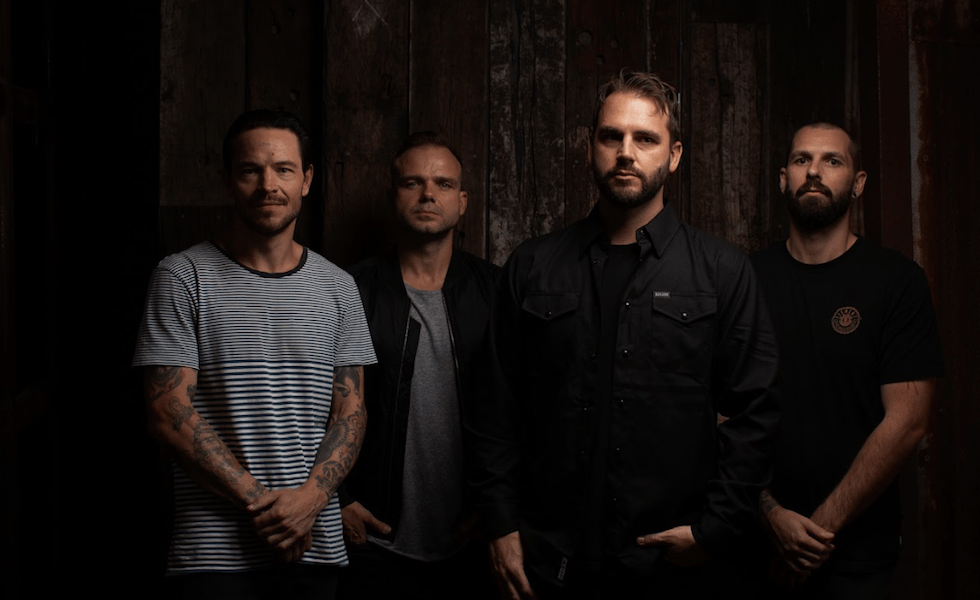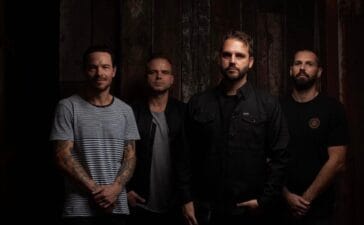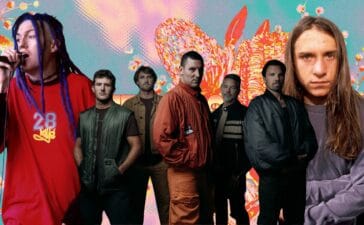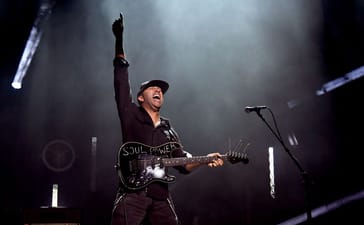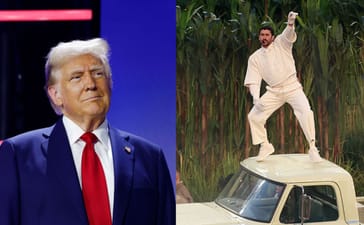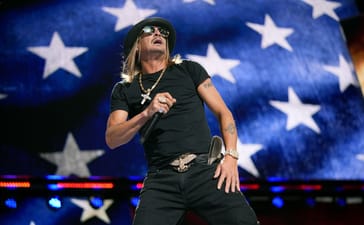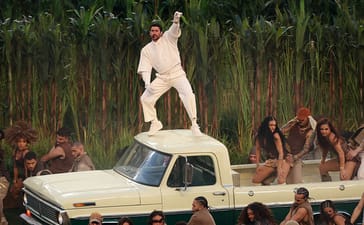In a reunion that few likely could have envisioned, Aussie metallers Sunk Loto have announced a return to the live fold after a 15-year absence. They’ve been greeted with considerable enthusiasm, both in terms of social media response and ticket sales, with a series of sold out shows scheduled.
Originally known as Messiah, the youthful act was formed in 1997 on the Gold Coast. For the majority of their tenure until splitting in 2007, Sunk Loto was comprised of Jason Brown (vocals), Dane Brown (drums), Luke McDonald (guitars) and Coffs Harbour product Sean van Gennip (bass). They released the decidedly nu-metal leaning Society Anxiety EP (1999) and debut album Big Picture Lies (2000), before taking a quantum leap forward with 2003’s Between Birth and Death LP. The group played major festivals like Big Day Out, Vans Warped Tour and Homebake during their career, and supported a slew of international acts, including A Perfect Circle, Korn and Sevendust.
Now they’re back and motivated to embrace a whole new chapter. BLUNT spoke with McDonald and Jason Brown, who took us through the group’s career up to this point – and also revealed what’s next.
How old were you both when the band started, and what was the initial goal?
Luke: When we started, Jason and I were both 14. Dane would have been 12, and Sean was about 16. Basically, me and Dane met in a music store with the old bass player Miles Matheson, and he just asked me straight out if I was in a band, because I used to go there every afternoon to play guitar. I met Dane upstairs and he said, ‘Do you guys want to have a jam?’ So, we started jamming, and the goal was just to play Pantera covers, and other bands that we loved. Grinpsoon too. The goal has always just been to write the best music we possibly can. Everything else that comes with it is a wonderful luxury.
How did a collection of teenagers playing heavy music score a deal with Sony?
Jason: I remember we’d actually started gigging very young, and we entered ourselves into a battle of the bands thing, the Queensland High School Rock Awards. We played at Festival Hall in Brissy, and it was amazing to be playing in a big venue at a young age like that, at 14 years old. Sony happened to be there, and we won that night. It just kind of went from there; they started giving us a few sessions in studios around our area, just to see how we’d go in a recording environment. I would say after three or four demos with them they tabled an offer to us. It was pretty crazy. They came and watched us a few more times live before we signed a deal.
It wasn’t just the swift turnaround demanded of them after releasing Society Anxiety that hindered their career progress. There was also the no small matter of file-sharing, with Big Picture Lies reportedly being among the most illegally downloaded releases of that year. What was it like being in the midst of such a seismic shift within the music industry?
Jason: That was right when Napster basically became a big thing, unluckily for us. The first EP, I don’t think downloads and Napster were around, and 18 months later it arrived and we were getting punished with the downloading stuff, which didn’t help the cause. It was probably not a good time to be releasing new music with that downloading stuff going on. The first album was a bit odd for us, because we’d had all the time in the world to make that EP and feel comfortable, and I think off the back of that the record company just wanted us to get something (out) quickly, strike while the iron was hot. I don’t feel that we quite had time to develop and write the album that we felt like we really wanted to write.
Luke: We were changing too, we had already grown a bit. Because the thing was, we listened to such a vast range of music, and there was so much new music coming out in the ’90s, by the time even six, seven months later after the EP came out and we went to the studio to do that album, we were still changing, we were already changing our style. We didn’t know if we wanted to keep going in that sound. That’s why our records, they’re all still us, but they’re all different. I can appreciate Big Picture Lies a lot more now than I did back then, because I did feel we were kinda rushed into that record a little. And that’s why we took our time so much with Between Birth and Death.
Jason: I think we were just still figuring out who we were, and it was just maybe 12 months too early in that stage of growing as a band to record that album. It was a melting pot of influences on that album, and you can probably hear it. But I think in retrospect it holds up pretty well, and more than 20 years after we released it, some of those songs are really shining in the rehearsal room that we plan on playing live.
Between Birth and Death was a staggering achievement for the quartet creatively, if not commercially. A much heavier, darker, multi-faceted release exploring loss, addiction, mental health and socio-political themes, critics responded strongly. This scribe was in the front row when they played at Wollongong UniBar in 2004 on the ‘Army of Darkness’ tour. What was the catalyst for making a much more aggressive and darker album the second time around?
Jason: I think that was probably like two albums’ worth of change in the band, because we didn’t get to experience it with the first album. And off the back of, we really would have liked to have shown our true evolution. We just walked away going, ‘let’s make this thing the best we can possibly do, and not release anything until we’re 100 per cent happy’. I think it took us nearly three years to write that record, and we would have written 30-plus songs. I reckon we had two to three albums’ worth of material. I guess we felt like we wanted to make up for (material) that was not reflective of how we’d evolved on the first album.
I understand Sony didn’t embrace the heavier approach, which would have caused issues. And once the album was released, did you find it difficult trying to win over the more hardened metal crowd who had previously dismissed the group?
Luke: We definitely went into this record wanting to make something abrasive and something that would really prove that we had arrived now. And with Sony, what happened was, they wanted a quick turnaround again. They wanted us to get back in there and make a record, and I can understand that. But because we didn’t have the time that we wanted with the first record, we really put our foot down and said, ‘we’re going to take our time with this one’. We wrote a lot of material, and when we finally decided we were ready to go, Sony said, ‘we don’t hear the single’. So basically Jason went back and wrote Everything Everyway, and they were happy with that song. And it’s actually my favourite Sunk Loto song.
Jason: We definitely wanted to show the heavier crowd that that was where we were heading. And I reckon pretty early on people clued onto it on the metal scene, that, ‘hey, these guys are the real deal’. And we noticed our crowds went from decent to selling out on that tour pretty quickly when we first released Between Birth and Death. We saw that growth in fan-base off the back of that.
Luke: When we were writing that album, Jason and I were only 19 years old, Dane was 17, and Sean would have been 21. To think back now, most people consider that our grand opus, and to think that we wrote it when we were like 19 and we were recording it when we were 20 is pretty crazy.
Although the band worked on new material, and even played some of it live during a national tour with COG and Mammal, they never issued a follow-up to Between Birth and Death before splitting in 2007. It felt like Sunk Lotto just fizzled out in a most unceremonious fashion. Was that disappointing?
Jason: Yeah. I think we were feeling the pinch of just doing it from a young age; fatigue had caught up to us. We hadn’t really experienced what it was like to be normal from the age of 13-14. We sort of hit our mid-20s and Sean was not a part of the band any more. And that probably hit us harder than we realised.
Luke: I was deep in drug and alcohol addiction, so at the time I was just trying to ignore all the problems and just go into a deep hole of drugs and alcohol, and just hope that when I turned up to each jam session that everyone would be there. And I regret that. I think if I had been sober I could have perhaps pulled the band together and we could have figured things out. But I just wasn’t in a place mentally to do it.
After parting ways the members engaged in various projects, including Electric Horse and Jails and Churches. Sunk Loto had flirted with overseas touring, but following their demise a new crop of home-grown acts, spearheaded by the likes of Parkway Drive and I Killed The Prom Queen emerged and took Australian heavy music to international stages.
Eventually, a reunion begin to take shape. “I’ve been sober off and on for about the past nine years, and I always felt that if I could get enough sobriety time, abstinence from alcohol and drugs, that potentially the band could get back together,” McDonald says. “I had about 12 months of being sober and I reached out to Sean, just to let him know that I was 12 months’ sober, and he said, ‘that’s excellent, I’d love to get together and finish what we started with the Jails and Churches stuff’. And from there I organised to have coffee with him, and I was thinking… I wanted to see if he’d be open to doing Sunk Loto again. He’d always said no in the past – for about the past decade, he just said, ‘let’s just focus on what we’re doing now’.”
However, a group lunch soon led to a rehearsal. “It could have gone any way – we could have turned up and been like, ‘oh yeah, that was okay’,” Jason says of the jam session. “But it didn’t. We turned up and it was just electric – probably more electric than we ever were. And that’s why we decided to play shows, because this is too good not to get back out there.”
Now that you’re back, do you feel like Sunk Loto has unfinished business?
Luke: Yeah, absolutely. Provided everything goes well, we’re definitely going to make some more music, and we’ve got a song that we’re looking at perhaps playing (live) called Jaded, that’s from the Between Birth and Death sessions.
Jason: We just want to reconnect with the fans, and sort of make up for the lost years, the 15 lost years where everyone missed out, we missed out and we’re coming back better and stronger than ever. We’re so lucky to be coming back to sold out shows. We can’t wait.
Sunk Loto
First Shows In 15 Years
With Special guests
Tickets available now
Friday, 29th July – SOLD OUT
Mo’s Desert Clubhouse, Burleigh Heads
Saturday, 30th July
The Triffid, Brisbane
Tickets: Sunk Loto
Saturday, 6th August – SOLD OUT
The Triffid, Brisbane
Friday 25th November
Max Watts, Melbourne
Tickets: Sunk Loto
Saturday 26th November
The Factory Theatre, Marrickville
Tickets: Sunk Loto


